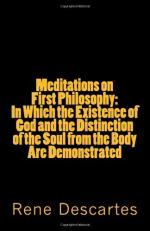H. M.
THE EXISTENCE OF GOD
Section I. Metaphysical Proofs of the Existence of God are not within Everybody’s reach.
I cannot open my eyes without admiring the art that shines throughout all nature; the least cast suffices to make me perceive the Hand that makes everything.
Men accustomed to meditate upon metaphysical truths, and to trace up things to their first principles, may know the Deity by its idea; and I own that is a sure way to arrive at the source of all truth. But the more direct and short that way is, the more difficult and unpassable it is for the generality of mankind who depend on their senses and imagination.
An ideal demonstration is so simple, that through its very simplicity it escapes those minds that are incapable of operations purely intellectual. In short, the more perfect is the way to find the First Being, the fewer men there are that are capable to follow it.
Sect. II. Moral Proofs of the Existence of God are fitted to every man’s capacity.
But there is a less perfect way, level to the meanest capacity. Men the least exercised in reasoning, and the most tenacious of the prejudices of the senses, may yet with one look discover Him who has drawn Himself in all His works. The wisdom and power He has stamped upon everything He has made are seen, as it were, in a glass by those that cannot contemplate Him in His own idea. This is a sensible and popular philosophy, of which any man free from passion and prejudice is capable. Humana autem anima rationalis est, quae mortalibus peccati poena tenebatur, ad hoc diminutionis redacta ut per conjecturas rerum visibilium ad intelligenda invisibilia niteretur; that is, “The human soul is still rational, but in such a manner that, being by the punishment of sin detained in the bonds of death, it is so far reduced that it can only endeavour to arrive at the knowledge of things invisible through the visible.”
Sect. III. Why so few Persons are attentive to the Proofs Nature affords of the Existence of God.




